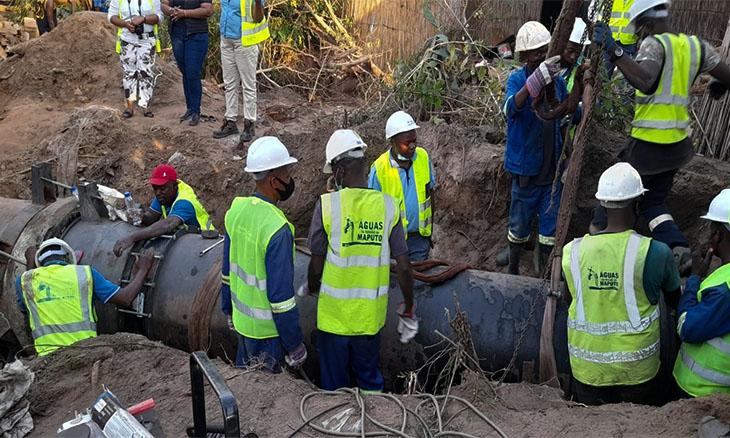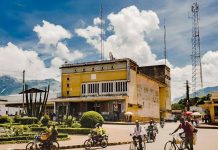Africa-Press – Mozambique. The rupture of a water main in Matola on Sunday afternoon caused the destruction of part of a house and perimeter walls, of appliances and many other goods in houses close to the scene, to the despair of residents. The broken water main, built in colonial times and with 60 years’ service behind it, was already ‘on its last legs’.
The incident left around 5,000 people without water, at a time when, in addition to satisfying basic daily needs, it is essential to combating the Covid-19 pandemic.
Visiting the site, our reporting team found a bleak scene, residents having passed a predictably difficult Sunday night.
Built on top of a colonial era water main, Joaquim Fernando’s house was the worst affected. The ceiling and the walls of the bedroom were completely wrecked, unable to withstand the fury of the five-metre waterspout resulting from the rupture.
Indeed, everything in Joaquim Fernando’s home was drenched. “Everything’s soaked: clothes, appliances, books, even our personal documents. It’s all out in the sun now, to see if we can recover anything,” he seethed.
Fernando, like some of his neighbours, had a difficult night, his mattresses and bedding being completely soaked.
“We had a bad night. We had to all cram into the same room to avoid the drizzle, using a plastic sheet to cover the bedroom, which was left without a ceiling. But it was not easy to get through the night,” Fernando related.
One image in particular caught our attention: little Jonas, checking the damage to his textbooks and exercise books. They were all wet. While older siblings put mattresses and bedding in the sun, he put out his notebooks and textbooks, in hope of satisfactory results.
According to his parents, Jonas and other children in the neighbourhood were supposed to go to school, but were unable to.
Grandma Julieta’s house didn’t escape either. Everything was wet. The night was long. All that was left to her was to clear the mud which chose to invade her humble abode.
“The water flooded my house and destroyed lots of things. We’re still battling to clear the mud out. We don’t have any soap to clean things. Even the bag of rice got wet, and we were only able to salvage the top part, which didn’t get wet. We can’t eat the rice from the bottom, as it was in contact with water mixed with faeces,” an alarmed Julieta Maússe said.
And it not just about their accommodation that the residents of Língamo are up in arms. They lack drinking water, their only solution to get it from a completely unknown source, under the bridge.
The water seems to be clean, but its provenance is unknown, according to Língamo resident Cecília Neves.
“After the main water pipe broke, we ran out of water, so we decided to come here. We will use this water for washing clothes, dishes and other things, but if there is no alternative, we will use it for drinking, although it is not advisable, due to the risk of contracting diseases,” Cecília said.
They know the risk, but the residents of these neighbourhoods say they have no other option but to turn to that source whenever there is a shortage of water.
On site, director-general of the Water Supply Investment and Heritage Fund Victor Tauacale, overseeing the pipeline replacement works, said they were at a fairly agreeable level, and the approximately 5,000 residents of the Trevo and Matola A neighbourhoods would have water supply restored by 4:00 p.m. this Monday (27-09).
“Work is well advanced, and we expect to start tests around 3:00 p.m. [Monday] and that water supply to the affected families will be restored at around 4:00 p.m. because after that we will open the closed valve to avoid waste,” he explained.
Tauacale also promised those affected that FIPAG would be compensation for the damage caused.
“We will reimburse for damages, because it was a natural event, but they are not to blame for what happened, nor can they be harmed, so we will make up for it. At the moment, we are carrying out a survey of the damages,” Tauacale said.
The water pipeline, like many other parts of the water distribution system in Maputo city and province, has been in operation for about 60 years. FIPAG says that most has been replaced in many places, and that the subsequent phase is testing.
It should be noted that the house worst affected, as well as the neighbouring houses, were erected on top of the water main, and moreover have high voltage electricity lines pass directly above them. This is, therefore, an area which should be reserved as to the manner of its use.
By
Inalcide Uamusse






